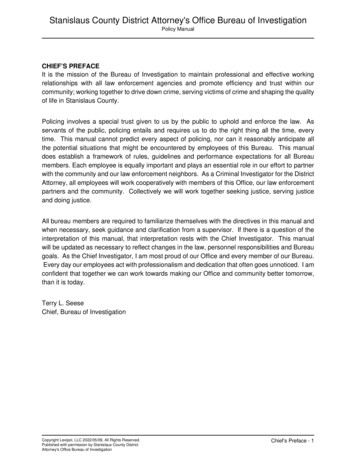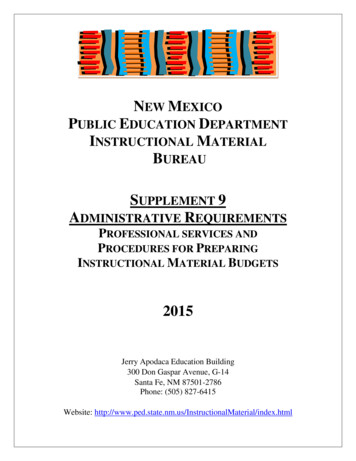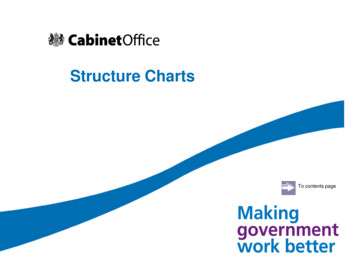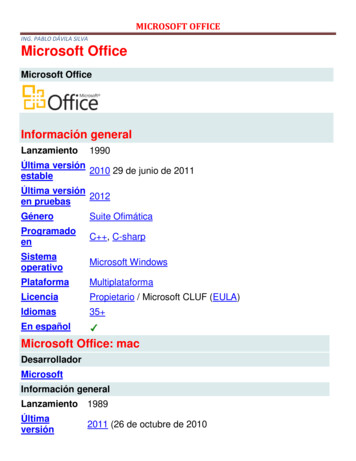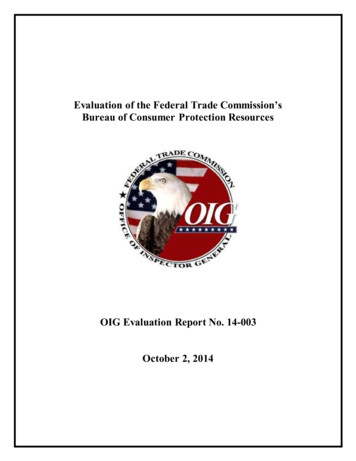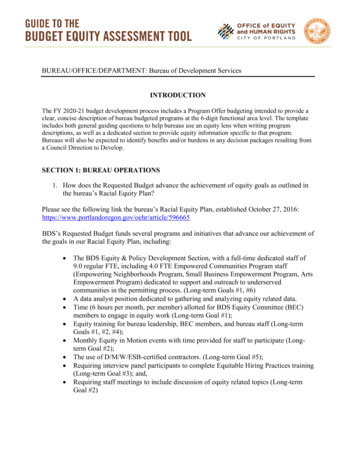
Transcription
BUREAU/OFFICE/DEPARTMENT: Bureau of Development ServicesINTRODUCTIONThe FY 2020-21 budget development process includes a Program Offer budgeting intended to provide aclear, concise description of bureau budgeted programs at the 6-digit functional area level. The templateincludes both general guiding questions to help bureaus use an equity lens when writing programdescriptions, as well as a dedicated section to provide equity information specific to that program.Bureaus will also be expected to identify benefits and/or burdens in any decision packages resulting froma Council Direction to Develop.SECTION 1: BUREAU OPERATIONS1. How does the Requested Budget advance the achievement of equity goals as outlined inthe bureau’s Racial Equity Plan?Please see the following link the bureau’s Racial Equity Plan, established October 27, 96665BDS’s Requested Budget funds several programs and initiatives that advance our achievement ofthe goals in our Racial Equity Plan, including: The BDS Equity & Policy Development Section, with a full-time dedicated staff of9.0 regular FTE, including 4.0 FTE Empowered Communities Program staff(Empowering Neighborhoods Program, Small Business Empowerment Program, ArtsEmpowerment Program) dedicated to support and outreach to underservedcommunities in the permitting process. (Long-term Goals #1, #6)A data analyst position dedicated to gathering and analyzing equity related data.Time (6 hours per month, per member) allotted for BDS Equity Committee (BEC)members to engage in equity work (Long-term Goal #1);Equity training for bureau leadership, BEC members, and bureau staff (Long-termGoals #1, #2, #4);Monthly Equity in Motion events with time provided for staff to participate (Longterm Goal #2);The use of D/M/W/ESB-certified contractors. (Long-term Goal #5);Requiring interview panel participants to complete Equitable Hiring Practices training(Long-term Goal #3); and,Requiring staff meetings to include discussion of equity related topics (Long-termGoal #2)
a. In what ways does the Requested Budget benefit Indigenous people, Blackpeople, immigrants and refugees, people of color, and people withdisabilities?The Requested Budget funds the work of the Empowered Communities Program, whichspecifically targets working with and reaching out to historically underserved communities,including Black people, Indigenous people, people of color, people with disabilities, andimmigrants and refugees. Within this program: The Empowering Neighborhoods Program assists clients of color and those with ADAdisabilities who have received enforcement letters from the City with reaching fullresolution of the issues related to building and zoning code standards.The Small Business Empowerment Program assists historically marginalized businessowners who have experienced disproportionate barriers in the development reviewprocess, creating opportunities to successfully obtain permits for their properties.The Arts Empowerment Program helps artists and arts organizations by prioritizinghistorically marginalized communities who have faced disproportionate barriers topermitting, access information needed to ensure all required permits related todevelopment are obtained.The work of the programs within the Empowered Communities Program extends tocollaborating with the services BDS provides bureauwide, including zoning code administration,permitting services, plan review, inspections, and compliance, as required to obtain resolutions.The Property Compliance Inspections Division also performs work which benefits underservedand marginalized communities. Housing and commercial property maintenance violationinspections help protect the community from unsafe and unsanitary conditions in both residentialand commercial buildings. Buildings and housing units in disrepair often disproportionatelyeffect low income communities and communities of color due to affordability issues and ahistoric lack of access to resources. Rental housing inspections serve communities in low incomehousing that is being poorly maintained, and these compliance programs are being prioritized byincreasing staff allocations to these programs.The Process Management section in the Permitting Services Division works with ProsperPortland and the Portland Housing Bureau to identify projects where the applicant or end-usersare a historically marginalized group(s). These projects are assigned a Process Manager andgiven priority status to assist in the event of unforeseen delays. Status updates on priorityprojects are communicated to bureau management and the Mayor’s Office regularly.Land Use Services is reinstating funding to offer internships through the Portland StateUniversity Master of Urban and Regional Planning Diversity Internship Program that providesinternship opportunities at BDS for students from communities of color and underservedcommunities. Also, a concierge service has been established to assist faith-based communitiesthat want to develop housing to help address the housing crisis.2
BDS recently completed a comprehensive restroom remodeling project in the 1900 Building, forwhich ADA compliance was a major factor. Accessibility will also be a significantconsideration in the upcoming Development Services Center renovation project, which isexpected to take place during the FY 2020-21 fiscal year.b. In what ways does the Requested Budget negatively impact Indigenouspeople, Black people, immigrants and refugees, people of color, and peoplewith disabilities?To the extent that the majority of the services provided by BDS are provided at the initiative ofits customers, the historical and existing disparities affecting Indigenous people, Black people,immigrants and refugees, people of color, and people with disabilities are not lessened as a resultof the Requested Budget if they are not evaluated using the Racial Equity Tool. The mostsignificant negative impacts of concern are in general related to housing: the affordability ofhousing, housing discrimination, exposure to substandard and unsafe living conditions, increaseddisplacement and housing instability as rents increase and lower cost housing (and in some casessubstandard housing) is demolished and sites are redeveloped with higher cost housing. Thehousing that gets developed on these sites may include more dwelling units, and may or may notinclude units at affordable rates, and may or may not be subject to the zoning code’srequirements for affordable housing units depending on those regulatory triggers, and increasedeconomic disparity from housing affordability.There is a need to continue greater outreach using culturally appropriate approaches to engagecommunities which have historically been negatively impacted by barriers to the permittingprocess. Other services and programs will be necessary to reduce adverse impacts and toempower these communities.2.) What are the insufficiencies in the base budget that inhibit the bureau’s achievementof equity or the goals outlined in the Racial Equity Plan?The lack of comprehensive data tracking and analysis in place to evaluate insufficiencies whichwould inhibit the bureau’s achievement of equity goals is a bureauwide issue. This budget takesa first step by including a dedicated data analyst position to gather and analyze equity relateddata.Secondly, the Property Compliance Inspections Division is reliant on the assessment of codeenforcement fees for funding critical property maintenance inspections, which limits flexibilitywhen working with customers to gain compliance without imposing a financial burden.Furthermore, these inspection programs operate on a complaint-based system which potentiallyputs vulnerable populations at risk due to the comparatively higher frequency of reporting ofolder, less maintained and thus more affordable properties in these communities. As a result, theHousing Inspections and Construction Code Section’s enforcement policies are being amendedwith the goal of reducing negative financial impacts imposed on low income property ownersand other marginalized community groups with barriers to success. These changes include anew equity-focused process for reviewing active owner-occupied housing cases with non-safety3
related maintenance violations, which provides an automatic enforcement fee review and referralto various programs for assistance.The Empowered Communities Program is experiencing high demand for service. The bureauwill be evaluating demand for services and expansion of the program as necessary.3.) Please take a look at the City of Portland’s workforce demographic cle/595121. How does the bureau’sRequested Budget support employee equity in hiring, retention, and inclusion,particularly for Indigenous people, Black people, immigrants and refugees, people ofcolor, and people with disabilities?BDS has previously brought in a consultant to provide Equitable Hiring Practices training toboth management and staff, and instituted a policy requiring participation in order to serve on aninterview panel. As some time has passed since these trainings were offered, BDS may need tooffer more trainings in the future to continue this policy. BDS’s Equity and Policy DevelopmentTeam is currently evaluating the bureau’s retention and inclusion practices and makingrecommendations to bureau leadership through BDS’s Equitable Approaches to Retentionprogram.The Land Use Services Program in partnership with PSU’s Diversity Program is will employthree interns, which gives these students valuable work experience to put on their resume. Upongraduation, if there are job openings at BDS, their experience at the bureau gives them acompetitive advantage in competing for these jobs and a foot in the door.4.) How does the bureau use quantitative and qualitative data to track program accessand service outcomes for different populations? Please provide the data source(s)BDS does not have a comprehensive system in place to analyze quantitative and qualitativeevidence to track program access and service outcomes to different populations. This area hasbeen identified as an area of need and the bureau expects to make progress in addressing thisdeficiency in the next year through hiring a dedicated data analyst to gather and analyze equityrelated data in tandem with the Equity & Policy Development staff work on the 5-yr RacialEquity Plan.BDS has not previously collected demographic data on its customers outside the limited datacollected by the Empowered Communities Program. The Enhanced Rental Inspections Programis considering gathering demographic data in the future, but resources are necessary to developthe methodology and systems of collection. The team is focused on understanding the impacts ofthis program on the community and identifying possible ways to make the program moreeffective, both in protecting the health and safety of tenants and reducing displacement.In addition, the Property Compliance Division has developed a methodology to increase theeffectiveness of the current database system to collect baseline quantitative data on HousingCases. This data will be used in the coming year to apply a racial equity lens to the work andalign resources more effectively to meet these goals.4
5.) What additional disaggregated demographic data will the bureau collect, track, andevaluate to assess equity impacts in community moving forward, and inform futurebudget decisions?BDS does not have a comprehensive system in place to disaggregate demographic data for thepurpose of assessing impacts in the community. Current implementation of the Results BasedAccountability framework and methodology aims to partner with city agencies and utilize proxydata to help understand the impacts of BDS services on Portland communities. While BDScontinues to develop the tools and resources necessary to safely collect and analyze, any datacollected (not already described in the previous question) would be in addition to the limitedamount collected currently.6.) Have you made significant realignments or changes to the bureau’s budget? If so,how/do these changes impact the community? Is this different for Indigenous people,Black people, immigrants and refugees, people of color, and/or people withdisabilities?In the past year the Empowered Communities Program, formerly named Specialized PermittingServices, was moved from the Permitting Services Division to the Equity & Policy DevelopmentSection. The services provided by Empowered Communities Program include the EmpoweringNeighborhoods Program, Small Business Empowerment Program, Arts Empowerment Program.These positions are focused on community empowerment, reaching equitable outcomesspecifically targeting Indigenous people, Black people, immigrants and refugees, people of color,and/or people with disabilities. Locating these services in the Equity & Policy DevelopmentSection helps these equity-driven programs by providing synergy between them and the otherequity-focused team members and personnel resources to further support their work. Theaddition of the data analyst position will give BDS greater capacity to track and monitoroutcomes and impacts.7.) If the bureau has capital assets, how does the Requested Budget take intoconsideration intergenerational equity (ensuring that those who are currentlybenefiting from the service are paying for its upkeep versus placing the financialburden on future generations)?BDS’s primary asset is the Portland Online Permitting System (POPS). The development andmaintenance of this system is funded thorough current and ongoing permit revenues, which arepaid by bureau customers. An equity lens will need to be applied to the POPS program toadequately evaluate intergenerational equity. The current five technology projects that make upPOPS are just the beginning, and there will be annual workplans for technology projectsdeveloped in an inclusive way in coming years, as we continue to make improvements to theaccessibility, transparency and types of services available through these systems. Each annualtechnology work plan will have an equity lens applied to it, at the early stages of development,including thinking through who benefits, and who pays for services.5
8.) If applicable, how is funding being prioritized to meet obligations related to Title II ofthe Americans with Disabilities Act and the bureau’s Transition Plan barrier removalschedule?This is not applicable to BDS.9.) If applicable, how does the bureau’s budget create contracting opportunities fordisadvantaged, minority, women, and emerging small businesses (D/M/W/ESB)?The BDS Racial Equity Plan (implemented 10/27/16) established a Year 3 goal that 50% ofcontracts with a value over 5,000 would have M/W/ESB participation. In 2019, 66% of BDS’scontracts of 5,000 (2 out of 3) used M/W/ESB-certified vendors.10.)If the bureau has dedicated equity staff, such as an Equity Manager, how werethey involved in developing the bureau’s Requested Budget?The BDS Equity & Policy Development Section and the BDS Equity Committee (BEC) havebeen involved from the early stages of the budget development process. Beginning in September2019, the Equity Manager was consulted regarding how to best work through the Budget EquityAssessment Tool. Equity & Policy Development staff also attended and led discussions at theBDS Budget Advisory Committee meetings focused on the bureau’s equity related work. TheEquity & Policy Development section is budgeted separately in its own cost center, and theEquity Manager was consulted regarding the budgeted expenditures for the section. Finally, theEquity Manager participated by reviewing and providing input on the Budget Equity AssessmentTool responses.SECTION TWO: EQUITABLE ENGAGEMENT AND ACCESS11.)What funding have you allocated in the bureau’s budget to meet the requirementsof ADA (Americans with Disabilities Act) Title II and Civil Rights Title VI? Thisincludes but is not limited to: Funding for translation, interpretation, video captioning, and otheraccommodations Translation of essential documents into safe harbor languages Engagement efforts with multilingual and multicultural communitiesFunds are budgeted and available for training, the development of additional materials, andresources for translation, interpretation, and video captioning. BDS utilizes Citywide contractsfor translation and interpretation services; however, the services are used infrequently. The BDSCommunications and Outreach section is responsible for enhancing and standardizing thebureau’s ADA-related efforts. The majority of all documents published and/or distributed byBDS are in the English language and are not translated for non-English speaking audiences.BDS has included an appropriation of 10,000 for language translation services in thisRequested Budget.6
12.)How has the bureau engaged with communities in the budget request to identifythe priorities, particularly with Indigenous people, Black people, people of color,immigrants and refugees, multilingual, multicultural, and people with disabilities.How are these priorities reflected in this Proposed Budget?The community engaged with BDS’s Requested Budget primarily through the BDS BudgetAdvisory Committee (BAC), which is comprised of representatives from communityorganizations, the development industry, the Development Review Advisory Committee, andBDS employees. The BAC convened three times during the budget preparation process(November 2019 – January 2020). The BAC meetings included discussions about how thebureau can better serve the community from an equity perspective. The Committee is submittinga report accompanying BDS’s Requested Budget.13.)How does this budget build the bureau’s capacity to engage with and includecommunities most impacted by inequities? (e.g., improved leadershipopportunities, advisory committees, commissions, targeted community meetings,stakeholder groups, increased engagement, etc.)BDS’s budget includes funding to support its two primary stakeholder/community advisorybodies, Development Review Advisory Committee (DRAC) and Budget Advisory Committee(BAC). The BAC provides opportunities for community representatives to engage with thebureau regarding BDS programs, services, and budget. With its current membership makeup,the DRAC is not adequately engaging communities most impacted by inequities. In order toenhance the bureau’s capacity to engage with communities most impacted by inequities, DRACneeds to do outreach to fill other seats with diverse representatives and provide education andtraining for current DRAC members. The bureau is focused on putting together a work group ofemployees to recommend strategies to build and sustain better relationships with disenfranchisedcommunities.In addition, BDS’s budget includes funding for staff actively involved in outreach tocommunities most impacted by inequities, most notably the community empowerment work ofthe Empowered Communities Program. Prioritizing these expenditures will help to addressengagement with these communities. In the current fiscal year, several “listening sessions” wereconducted in different communities, to begin the repair and relationship building needed toeffectively engage and partner with these communities. This work is planned to continue in FY2020-21, with the goal of better understanding their needs, and addressing these needs in waysthat work for them.14.)How does this budget build community capacity and power in communities mostimpacted by inequities? (e.g., improved leadership opportunities within BureauAdvisory Committees, community meetings, stakeholder groups, increasedengagement, etc.)BDS’s two primary stakeholder/community advisory bodies, Development Review AdvisoryCommittee (DRAC) and Budget Advisory Committee (BAC) are funded in this Requested7
Budget. As previously mentioned, the BAC provides opportunities for communityrepresentatives to engage with the bureau regarding BDS programs, services, and budget. Withits current membership makeup, the DRAC is not adequately engaging communities mostimpacted by inequities but does have an open seat available. In order to enhance the bureau’scapacity to engage with communities most impacted by inequities, DRAC would need to fill thevacancy appropriately and provide education and training for current DRAC members.The Empowered Communities Program includes the Empowered Neighborhoods Program,Small Business Empowerment Program, and Arts Empowerment Program, each of which arededicated to helping the bureau reach equitable outcomes for their target customer bases.Demand for services provided by these programs is very high.In addition, BDS’s Property Compliance Division operates the Enhanced Rental InspectionProgram, which provides direct benefits to disadvantaged communities. The Oregon PublicHealth Institute’s Health Impact Assessment of 2012 found that the Enhanced Rental InspectionProgram had great potential “to contribute to improved health and health equity” for rentalhousing residents. Improving the effectiveness of this program is a high priority for the bureauand should continue to benefit communities of color and other marginalized groups. BDS is alsohopeful that the landlord registration efforts will result in additional resources to improve rentalinspections. g-inspections-program).8
A data analyst position dedicated to gathering and analyzing equity related data. Time (6 hours per month, per member) allotted for BDS Equity Committee (BEC) members to engage in equity work (Long-term Goal #1); Equity training for bureau leadership, BEC members, and bureau staff (Long-term Goals #1, #2, #4);


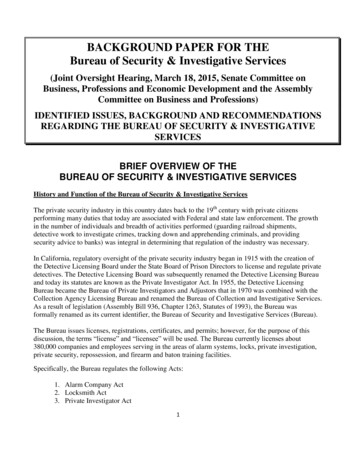
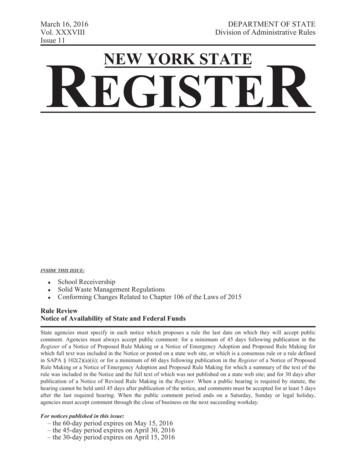

![Office 2010 Professional Plus Com Ativador Serial Keyl [EXCLUSIVE]](/img/61/office-2010-professional-plus-com-ativador-serial-keyl-exclusive.jpg)
